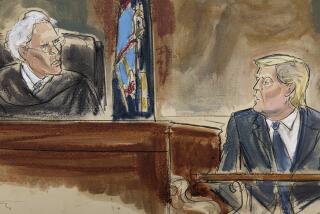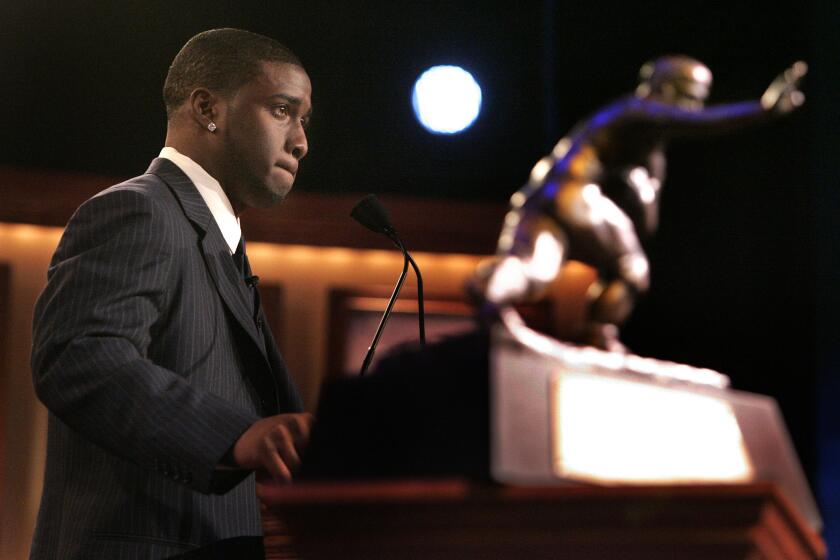A softer approach in Wall St. probes
In this season of white-collar scandal, the government has pursued corporate rogues with an unalloyed zeal, subjecting alleged wrongdoers to humiliating “perp walks” and rushing out criminal charges that could put them in prison.
But when it comes to the many revelations of disgraceful conduct on Wall Street, prosecutors’ approach this year has appeared kid-gloved in comparison.
Multiple state and federal probes of the practices of brokerage stock analysts and investment bankers during the bull market have shown “a clear commitment to deception on the part of a major portion of the industry,” said William Galvin, Massachusetts’ secretary of state.
Yet no criminal charges have been filed against any brokerage or individual analyst, and many legal experts doubt that prosecutors will choose to bring such cases — even though the scope of alleged Wall Street fraud arguably goes far beyond the insider-trading scandal of the late 1980s.
The government’s investigation in the 1980s resulted in guilty pleas and jail terms for an array of well-known financiers, traders and brokerage executives, including investment banker Martin Siegel of Kidder, Peabody & Co., takeover-stock trader Ivan Boesky and Boyd Jefferies, founder of brokerage Jefferies & Co.
The biggest name of all —junk bond king Michael Milken — also pleaded guilty to securities law violations, and his firm, Drexel Burnham Lambert, was slapped with a criminal indictment that destroyed it.
This time, major brokerages and regulators are engaged in talks to reach a “global” civil settlement of the various state and federal investigations. If a deal is struck, the probable outcome would be large fines and promises to reform — but no admissions of wrongdoing.
Some experts say that’s the way it should be. Fining the industry and forcing changes in the way brokerages do business could be more effective than locking people up in an effort to make examples of them, say some securities-law professors.
“That would give us an appropriate closure,” said Donald Langevoort, a law professor at Georgetown University. “We don’t need jail time.”
The public, however, may well be mystified as to why the revelations they’ve heard about brokerage practices in the late 1990s don’t rise up to criminal wrongdoing.
From the state and federal probes of stock analysts and investment bankers, investors have learned that some analysts privately disparaged stocks while advising the public to buy them.
Other analysts admitted to touting stocks simply to lure investment banking business from the companies.
A senior manager at one brokerage lamented that conflicts of interest had rendered his firm’s research “basically worthless.”
Meanwhile, congressional investigations have shown that brokerages routinely awarded shares in hot stock offerings to favored executives of companies the brokerages were wooing for banking business.
Deterrent Effect
Michael Josephson, president of the Josephson Institute of Ethics in Marina del Rey, believes criminal prosecutions could send a strong deterrent message, if the government has sufficiently strong cases.
Analysts “did real and meaningful harm and did it with what I think is malicious intent,” said Josephson, whose institute advises corporations and other entities on matters of ethics and conduct. “If we can prove that there was specific intent to defraud, then I think there should be prosecutions” of analysts and their firms, he said.
The government’s willingness to bring criminal fraud cases against executives at such failed firms as Enron Corp., WorldCom Inc. and Adelphia Communications Corp. may be whetting the public’s appetite for charges against brokerages, some experts say.
But a number of factors are working against a 1980s-style criminal sweep of Wall Street.
Some regulators fear that lengthy criminal prosecutions could spook depressed financial markets and further sap investor trust. And indicting any of the major brokerages at the heart of the government probes — such as Credit Suisse First Boston and Salomon Smith Barney — could impair their ability to operate and potentially threaten their existence.
An indictment could force the Securities and Exchange Commission or the New York Stock Exchange to immediately suspend a firm from certain business activities.
“It is highly unlikely that a firm would be prosecuted, regardless of the evidence, for fear of Drexelizing the firm,” said Jacob Frenkel, a former SEC attorney. “The indictment alone would be fatal.”
In New York, regulators also don’t want to exacerbate the brutal Wall Street downturn that has spawned large-scale layoffs.
“We will not act in a way that jeopardizes the stability of the main investment houses that are the backbone of the city, state and national economies,” said New York Atty. Gen. Eliot Spitzer, who has been at the forefront of the Wall Street probes.
Yet some regulators say criminal prosecutions, even of the biggest brokerages, may be needed.
The problem with civil sanctions alone, Massachusetts’ Galvin said, is that they have failed to prevent Wall Street from repeatedly finding new ways to break laws.
Galvin, whose office has been involved in a probe of Credit Suisse First Boston, recommended to Spitzer last month that he file criminal charges against the firm over alleged analyst conflicts.
“There is a role for criminal prosecution,” Galvin said. “Maybe a company has to be put out of business.”
Galvin’s office has helped stoke investor outrage through its discovery of inflammatory e-mails written by CSFB analysts.
In one e-mail, an analyst wrote that he maintained “buy” ratings on certain stocks but privately confided different advice to favored clients. He labeled the strategy the “Agilent Two-Step,” a reference to a company CSFB helped bring public in 1999.
The analyst explained in the e-mail, “That’s where in writing you have a buy rating ... but verbally everyone knows your position.”
CSFB, which has denied wrongdoing, says it is cooperating “with all government officials and regulatory authorities on these matters.”
If Spitzer were to decide to pursue criminal cases against individuals, he might have a better chance than federal authorities at obtaining convictions, experts say.
That’s because New York’s powerful securities law, known as the Martin Act, gives Spitzer broad leeway to bring and to win cases, said David Kaufmann, a former state prosecutor now with Kaufmann, Finer, Yamin, Gildin & Robbins.
Under state law, Spitzer would have to show only that an analyst knew his exaggerated stock ratings would hurt investors, even if the analyst didn’t know he was violating the law, said Kaufmann, an expert in the Martin Act.
“There is no question that this attorney general under the Martin Act possesses the power, if the allegations are true, to procure an indictment against analysts or their superiors who knew about [analyst hyping] and did nothing to stop it,” Kaufmann said.
Unless brokerages consent to significant reforms, Spitzer could “send a warning shot over the bow” by going after individual analysts, Kaufmann said.
Spitzer continues to suggest that he is leaving his options open with regard to individual brokerage employees.
“There are going to be individuals who pay a very high price for their conduct,” Spitzer said.
Burden of Proof
At the federal level, the Justice Department last year dropped a criminal probe into CSFB’s handling of new stock offerings.
It is unclear how strong the appetite for prosecution of individual brokerage employees may be at the Justice Department, which under former U.S. Attorney (and later New York Mayor) Rudolph Giuliani led the 1980s probe against insider traders.
The office of James Comey, the U.S. Attorney for the Southern District of New York, has asked Massachusetts to share documents from its CSFB investigation, sources said last week. And brokerage Morgan Stanley revealed in July that it received “subpoenas and requests for documents and information” from multiple regulators, including Comey’s office.
But some legal experts continue to doubt that federal criminal charges will be filed — in part because cases against analysts could be tough to win.
Federal prosecutors would have to prove that analysts had criminal intent, as opposed to simply spouting the bullishness that was expected of them.
What’s more, it could be hard to counter analysts’ likely defense that they believed what they said. Despite their seemingly incriminating tones, the e-mails regulators have revealed could prove less damning as defense lawyers portrayed them as taken out of context, legal experts said.
The late-1980s insider-trading charges were easier to prove, say former prosecutors who worked on those cases. Trading stocks based on privileged information was clearly a crime.
By contrast, writing bullish research reports — even if done to win financing business —falls into a gray area of federal law, one ex-prosecutor said.
“Publishing an opinion which turns out is not your true opinion ... it’s not quite as clear that’s a criminal offense,” the lawyer said.
Though he would favor criminal cases, Josephson, who is a former criminal-law professor, acknowledges that the lack of a clear legal violation could make it impossible to bring such cases.
Fear of losing, he said, may be holding prosecutors back. Losing a high-profile case, he worries, could send a message that it is possible to get away with wrongdoing on Wall Street.
Some experts say regulators are right to focus their energy on compelling the brokerage industry to dramatically change the way it does business, particularly in terms of insulating analysts from investment-banking pressures.
“That is a far more important fix than indicting, convicting and burning at the stake an individual analyst,” said Stephen Ryan, a former prosecutor who now is a defense attorney in Washington.
More to Read
Get our high school sports newsletter
Prep Rally is devoted to the SoCal high school sports experience, bringing you scores, stories and a behind-the-scenes look at what makes prep sports so popular.
You may occasionally receive promotional content from the Los Angeles Times.






